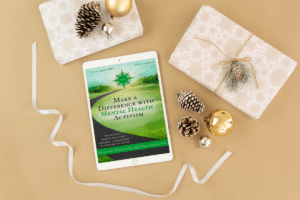- The Ultimate Guide to Journaling: How To Teach Expressive Writing - June 13, 2022
- Journaling: How To Use Writing To Support Your Mental Health - May 27, 2022
- How To Honor National Mental Illness Awareness Month With Action - October 3, 2021
Last Updated on August 21, 2025
What is Mental Illness Awareness Month?
For the 51.5 million Americans diagnosed with a mental health disorder and the millions more of their family members, every month is a mental illness awareness month. But October is the official Mental Illness Awareness Month (MIAM.) In 1990, Congress officially established the first week of October as MIAW in recognition of the efforts of the National Alliance on Mental Illness (NAMI) to raise awareness about mental health disorders.
Nationwide, communities volunteer their efforts to educate the public about mental illness, raise awareness, fight stigma and discrimination, and provide support.
Honor MIAM with Action
There are many ways you can take action during MIAM.
- Learn more about mental illness
- Erase stigma from your beliefs
- Get screened for depression
- Listen to others
- Donate
Learn More About The Issues
Throughout history, the symptoms of mental illness have caused fear, superstition, and condemnation. Some would say that, even now in the twenty-first century, we still have a long way to go. These statistics bear out the impact of mental illness:
- Found in 45% of the unhoused (30% of these have serious mental illness, such as schizophrenia)
- Found in 56% of state prisoners, 45% of federal prisoners, and 64% of jail inmates
- Directly linked to illicit drug use and alcohol and prescription medication misuse
- Costs the nation at least $193 billion annually in lost earnings
- Found in 95% of youth who die by suicide
- Found in 41% of war veterans
- Forces 8.4 million Americans to provide daily in-home care for a loved one
Mental health disorders are at the core of the worst of our country’s societal and economic problems.
Watch Andrea Landry: What I wish people knew about bipolar disorder
Erase Stigma From Your Beliefs
Stigma is when someone views you in a negative way because you have a mental illness. It is the number one reason people with mental illness are laughed at, misunderstood, bullied, and discriminated against. People who do not seek treatment for mental illness cite stigma as the primary reason.
Begin to pay attention to how often you hear people refer to others as crazy, nuts, insane, wacko, loony, nutjob, etc. We have become numb to thoughtless vernacular that is hurtful to people with a mental health diagnosis and those who love them.
Get Screened
You go to the doctor to get screened for diabetes, high cholesterol, and cancer. Getting screened for mental illness should be just as routine.
October 6th is National Depression Screening Day. Get a free online screening. Completing screenings will help determine if your recent thoughts or behaviors may be associated with a common, treatable mental health issue. It’s anonymous.

Support Others
The incidence of mental illness increased during the pandemic. I don’t think that’s a surprise to anyone, given how the pandemic has turned our lives upside down.
One simple way you can make a difference for someone who is struggling is to be there for support. Mental Health America offers 7 tips:
|
Practice active listening. Active listening is different than just hearing what a person has to say. A good active listener puts everything aside and gives their complete attention to the person who is talking; asks open-ended questions to get more details about the topic that is being discussed (ex. “And how did that make you feel?”); and takes moments throughout the conversation to summarize what they’ve been told and make sure they are understanding clearly. |
|
Don’t compare. If a friend or loved one is going through a tough situation and they come to you for support, you might feel tempted to tell them about something that happened to you and how you were able to get through it. It’s okay to share about similar experiences, but be careful not to compare because it can make someone feel like their pain isn’t valid. For instance, if they are telling you about a breakup, don’t mention how you had a much harder divorce. Focus on what you did to cope with feelings of loss or loneliness. |
|
Ask what you can do. It can be tempting to assume what would be helpful to someone who is struggling, but it’s always better to ask them what they need from you. If you ask and get a response like, “nothing, I’m fine,” offer up a few suggestions for things you would be willing to do (without being pushy). For instance, you could offer to come sit with them and watch a movie, cook them a meal, or pick up a few things for them at the store. |
|
Keep your word. If you have offered your support to someone and told them you would do something, keep your word. When a person is struggling, the last thing they need is to feel abandoned by someone else. If you absolutely can’t honor your promise, make a sincere apology and find another time that you can do what you said you would. |
|
Don’t judge. To be truly supportive of someone, you need to put your personal opinions and biases aside. They may be struggling because of a mistake that they made, or you may think that they are overreacting, but you will never know what it is truly like to be that person in this moment, and criticism is not helpful to their recovery. |
|
Offer to join them. When someone is going through a time of sadness or uncertainty, their emotions can take over and leave them feeling paralyzed and unable to take care of life’s obligations. Offering to go with someone to help them take care of responsibilities like walking the dog, going to the grocery store, attending doctor appointments, or picking up the dry cleaning can help them feel a sense of accomplishment and lift their spirits. |
|
Know when more serious help is needed. Sometimes the support that you can offer won’t be enough. If you notice that your friend or loved one continues to struggle after weeks or months, they may be showing signs of a mental health condition and likely need professional help. Don’t be afraid to encourage them to seek help from a mental health professional and offer to help them find a provider if needed. If someone you care about is in immediate danger of taking suicidal action, seek help by calling 911 or going to the closest emergency room. Trained crisis counselors are available 24/7 by texting “MHA” to 741-741 or calling 1-800-273-TALK(8255). |
Donate to NAMI
I’ve volunteered for NAMI for many years. Your financial contribution is a way to make sure no person or their caregivers are left without support. NAMI is the nation’s largest grassroots mental health organization, providing a national network of support and resources, both online and in communities across the country.
Want to Keep Helping Those with Mental Illness After MIAW?
My book Make a Difference with Mental Health Activism, co-written by psychologist Terri Lyon, provides a strategy for working on behalf of those directly affected by mental illness and their families through effective activism.
The purpose of Make a Difference with Mental Health Activism is to provide guidance and tools to help anyone envision creative ways to fight stigma, push for reforms, improve mental health services, and offer comfort for those with the lived experience and their loved ones. In 5 steps, you can transform your skills and talents into impactful change. Even experienced activists can see the volunteer work they do from a different perspective. The book is essential reading for anyone who has felt they don’t have a voice in the discussion about better mental health treatment and wants to help improve outcomes and quality of life.
Sound too good to be true? It is not only possible, here’s the roadmap.
- Focus your specific passion within mental health to avoid spreading yourself thin
- Identify the unique gifts, skills, and talents you can bring to this activism
- Craft a unique activism opportunity ideally suited to you
- Monitor your long-term effectiveness
- Stay motivated and avoid burnout
The book offers profiles of creative mental health activists, from podcasters and authors to a jewelry maker and quilter, and one courageous college student reminding students, “It’s OK to not be OK.”
Hobbies
The list of hobbies that can be turned into activism is endless: knitting, crocheting, pottery making, painting and drawing, gardening, and calligraphy, just to get things started. If you think creatively about what you bring to the table, the list of ways you could truly be a mental health activist is endless.
Work experience
Mental health nonprofit organizations and agencies are often staffed mainly by volunteers. Until you inquire within, you might not recognize how valuable your work experiences are to these groups. Were you a bookkeeper? Writer? Office or project manager? Programmer? Any work skill can find a home in a mental health nonprofit.
Make A Difference with Mental Health Activism: No activism degree required—use your unique skills to change the world is available as an e-book and in print at Life At The Intersection Books and Amazon.
A Thank You

Make a Difference with Mental Health Activism is a labor of love. But we’ve had much help along the way.
Toni Stephenson, Kathy Martin, Aleta Ledendecker, Jill England, and Pat Luna provided feedback on an earlier draft of Make a Difference. Their comments and questions were invaluable to improving the book. Thank you for taking the time to read the manuscript and provide us with your thoughtful feedback.
Thank you to Pete Earley for his example of courage in the face of his son’s mental health disorder.
Thank you to Dr. Ken Duckworth for his participation in this activism book. We hope that Ken’s book, You Are Not Alone: The NAMI Guide to Mental Illness and Recovery, is just the first of many books published by this country’s largest grassroots mental health organization.
Finally, we want to thank our Activists in Action: Christinea Beane, Christina Wolfgram, Karyl Chastain Beal, Miana Bryant, and Gabe Howard, for their willingness to tell their stories. It isn’t easy to be vulnerable about your experience with mental illness. Still, these activists understand how their stories can help others. The range of ways they make a difference for mental health activism shows the value of finding your purpose and understanding your gifts. Thank you for making the world a better place.
READ NEXT
Living Faith: Surviving and Thriving in the Wake of a Bipolar Disorder Diagnosis
Taraji P. Henson’s Passion for How to Impact African American Mental Health
- Think the Pandemic Was Hard? Consider the Impact on Those With Mental Illness
- With Mental Illness You Won’t Get a Casserole
- Stigma: A Thorn in the Side of Mental Health Care
- 12 Creative Ways to Support Mental Health
- The Olympics Opens the Door to Much-needed Athlete Mental Health Conversation
- Realizing The Impact of Mental Illness On My Family (NAMI)
Trish’s Blog at Strike The Write Tone




